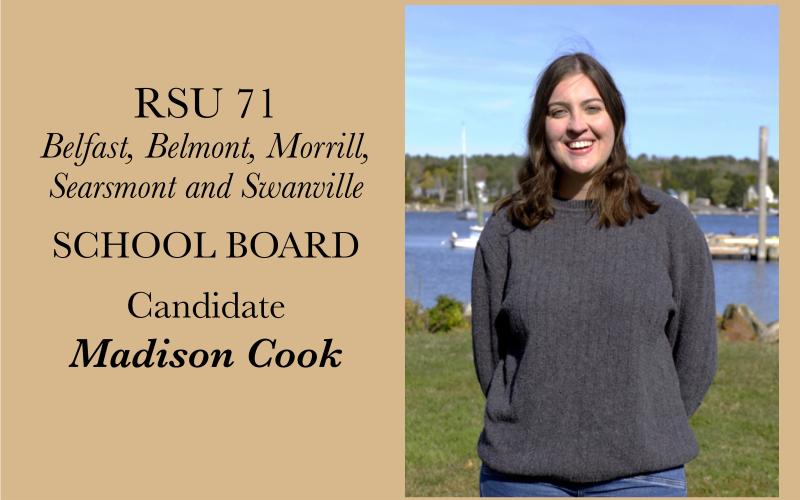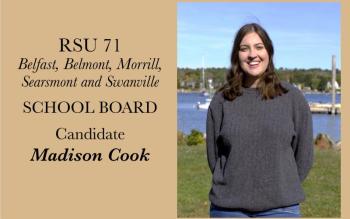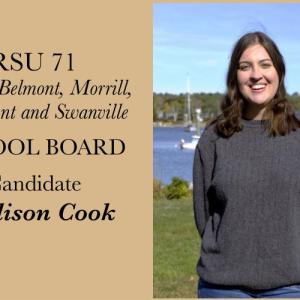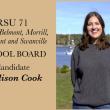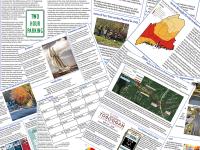RSU 71 School Board Candidate Madison Cook
On November 4, Belfast voters will consider several candidates to fill two Belfast seats on the Regional School Unit 71 (Belfast, Belmont, Morrill, Searsmont and Swanville) School Board. They are Madison Cook (declared write-in candidate whose name is not on the ballot), Martha Proulx and Alva Philbrook.
PenBayPilot.com has circulated questions to the school board candidates. Here, Madison Cook responds to them:
I grew up in Belfast, where I received a strong public education and enjoyed being a part of our tight-knit community. I’m also an educator, having taught at Virginia Tech’s School of Architecture, led international study programs with Smithsonian Student Travel and Putney Student Travel, and taught summer studios for high school students at Tulane University.
These experiences have deepened my commitment to collaboration, careful listening, and creating empowering learning environments for students of all ages. I recently returned home to Belfast, and I’m eager to support the public schools that helped shape me by serving on our school board.
1) What do you hope to accomplish as a public K-12 school board member?
As a public K–12 school board member, I hope to expand the range of programming available to students, supporting each individual’s educational pathway. Every student in our district has their own direction in life—some may pursue a four-year college program, while others may be drawn to the arts, the trades, or entrepreneurship. Our K–12 programs should nurture all of these pathways, encouraging students to explore, grow, play, and become engaged members of our community here in Belfast.
When I was a K–12 student in our public schools, I excelled in rigorous academic programming. But I also recognize that I would not have thrived in my traditional studies without outlets to experiment in other ways—to work in school gardens, to take art classes exploring everything from darkroom photography to glass and ceramic crafts, to play tennis, and to attend tech school, where I earned drafting certifications that prepared me to study architecture at the collegiate level.
Public schools—especially in our district—should be fully equipped and staffed to inspire passion, cultivate curiosity, and help every student achieve their highest potential.
2) How do you view the role of public education in the U.S., in Maine, and in the RSU 71 communities?
Public education faces serious challenges nationwide, but I’m optimistic about our ability to meet them with local strength and innovation. Public education in the U.S., in Maine, and here in RSU 71, serves three essential purposes: to build strong academic foundations, to prepare students for work and life, and to cultivate informed citizens who contribute to their communities. Like schools across the country, RSU 71 faces the challenge of achieving these goals in a time of rapid technological change and shifting educational and economic demands.
In conversations with neighbors and families across our district, I’ve heard a shared desire to strengthen academic programming and ensure every student leaves school confident in their abilities. Many are rightly concerned about foundational skills and student performance. I believe a renewed focus on foundational learning is essential. Elementary teachers, in particular, must have the materials, resources, and professional development they need to teach reading, writing, and math at a high level. A strong foundation in these areas empowers students to grow confidently into middle and high school programs that broaden their horizons and prepare them for meaningful futures.
At the same time, education is about more than test scores. Public schools connect communities, foster curiosity, and prepare students to participate in a changing world. Our role as a district is to protect that promise and ensure every classroom has what it needs to bring out the best in our students.
3) Is there enough local fresh food from area farms being integrated into RSU 71 free meal program?
When it comes to local, fresh food, there are already exciting programs connecting schools in our district with nearby farms and school garden initiatives. At the same time, the need is growing, and it will likely increase this November as SNAP benefits remain at risk in the wake of the national government shutdown.
There’s no better time to imagine and create a clear plan for strengthening our local food resources—especially for the most vulnerable students and families. We are fortunate to have an incredible network of local farmers and nonprofits to rely on. I’m inspired by MOFGA’s Maine Farm & Sea to School Network and by the many school gardens across our district, especially the BCOPE Garden Program.
I also see this as an opportunity to deepen partnerships between the district and the city to ensure we’re taking care of all our neighbors. How might we strengthen connections with the Belfast Soup Kitchen, the Belfast Teen Center, or even explore innovative ideas—like using public land for community farms that help combat food insecurity and poverty in our community?
4) Does the curriculum adequately teach all children and teens about their role in a participatory democracy?
We should expand these opportunities and empower students as leaders. Participatory democracy isn’t just about civics, history, and government classes at the high school level, as important as those are. Participatory democracy is about learning to think critically, voice opinions, collaborate with others, have productive disagreements, and take meaningful action when necessary. These lessons can show up in every classroom, in every subject, in every interaction. The more inclusive and empowering our schools are, the more engaged citizens we will graduate into our local community.
5) Should the subject of personal finance be addressed in all grades?
Yes, absolutely. Personal finance connects directly to how we teach fundamental skills and prepare students for life beyond K-12 education. The way these topics are introduced should naturally vary by grade level, and I trust our educators to help determine how personal finance can be meaningfully integrated into day-to-day learning.
6) Do the RSU 71 schools need to strengthen the science and technology curriculum. If so, how so?
Schools should always be looking for ways to strengthen and build on what’s working. Our district already has strong programs, and students benefit from partnerships like the Belfast Marine Institute’s Floating Classroom, which gets them out on Penobscot Bay exploring marine ecosystems and real-world careers in science and commerce. Experiences like that put students at the center of their learning and connect them to our community in powerful ways. The more we can invest in hands-on science and real-world exploration, the more our students will thrive.
7) Are there books that you would want pulled off the school library/classroom shelves?
No. I believe students should have access to a wide range of ideas and perspectives in our libraries and classrooms. While individual families may make a choice not to have their child read a certain book, nobody should deny that choice for other students and their families. I trust the expertise and professional education of librarians to make determinations regarding the books and media available on our library and classroom shelves.
8) What is your opinion of a cell phone-free policy in schools?
Students should have access to their cell phones while in school. Like other social distractions, I trust educators and administrators to set expectations for how phones can be used appropriately in the classroom. But considering the real-world responsibilities students carry—and the unfortunately persistent risks of school shootings—banning cell phones outright doesn’t make sense for this generation. Phones are an important tool for communication, safety, and staying connected to family, and policies should reflect that reality.
9) How will you, as a board member, help reduce the fiscal load on the taxpayer to fund education and maintain the facilities?
I hope to approach fiscal concerns with intention and balance. While it’s important to be mindful of the tax burden on our community, it’s equally important to invest in high-quality education and programs that provide lasting value to students and strengthen our local community. External grant funding can play a key role in enriching programs and expanding opportunities for innovation, reducing reliance on local dollars. I am committed to being a careful steward of taxpayer resources, exploring every avenue to manage costs without compromising the educational excellence our students deserve.
We must also continue to advocate at the state level for changes to the formula that funds education. The current formula is unfair to coastal communities like ours that have seen higher property values driven by vacation home purchases but are still predominately made up of working class families. Revisiting this formula and increasing state investment in school facilities would go a long way to offsetting the local taxpayer impact.
10) What books are you reading these days, and which do you recommend others read?
I recently attended the Association of Collegiate Schools of Architecture conference in Boston which was focused on architectural pedagogy in the age of artificial intelligence, so I’ve been reading two key books on that topic.
One of my favorite books to recommend is Jan Gehl’s Cities for People. I often have the opportunity to lead international travel programs for high school and college students, and this book has been a wonderful way to start conversations about how different cultures shape their cities—and how we can imagine new ways of building community together.
11) Anything else you’d like to address? Free space!
I’m running as a write-in candidate, so I’ve been getting out into our community, touring our school facilities, engaging in dialogue with other candidates, and meeting with current and former teachers, students, administrators, and other community members. During these efforts, I’ve been inspired by how much we all agree on the importance of our public schools. Even those without children currently enrolled in our district are deeply invested in our collective success and in shaping a shared vision for the future of RSU 71.
That love and support for our public schools is what motivated me to run for this seat and to be a voice for strengthening public education for all of our students.

